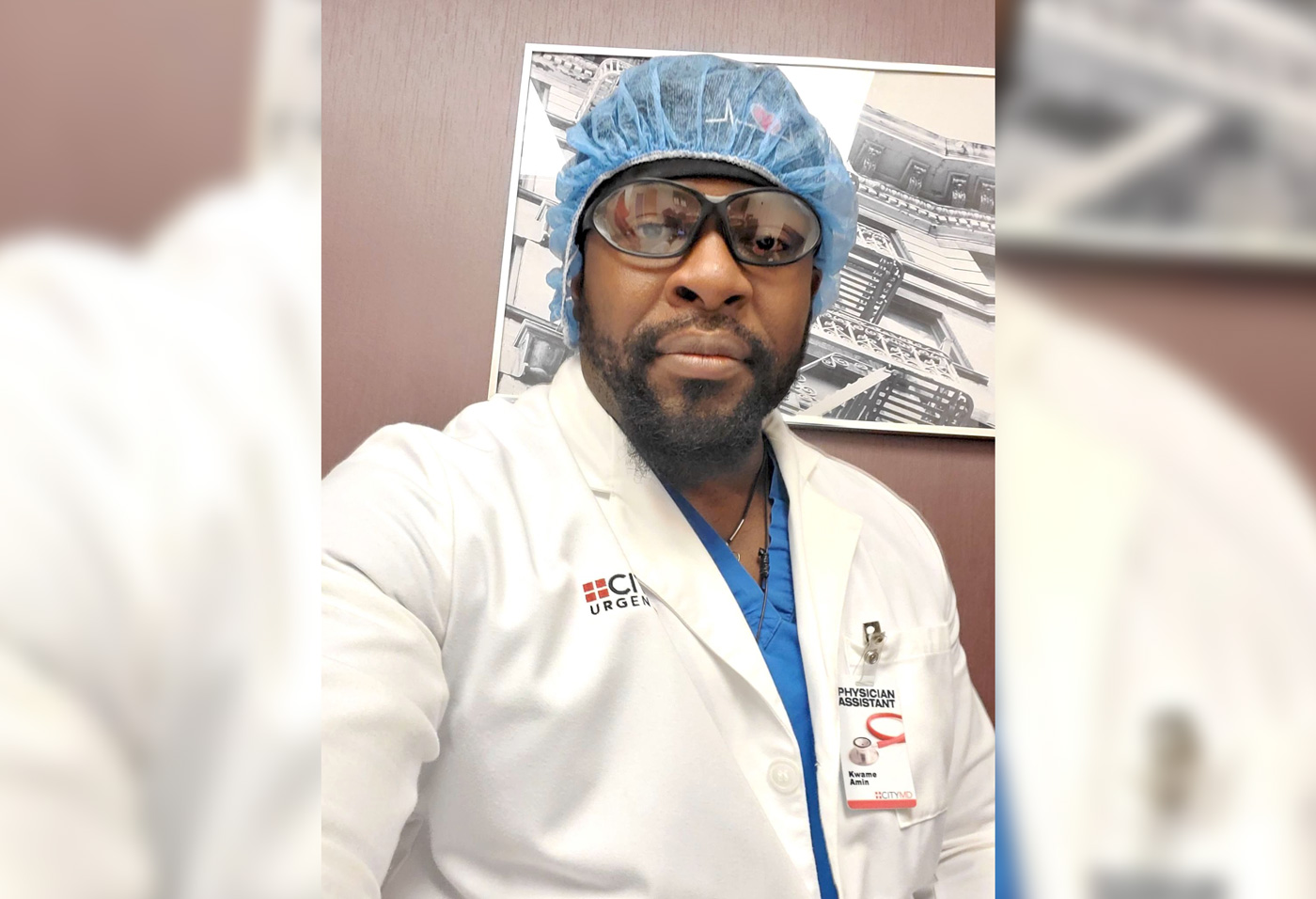
February 2, 2021
Borough of Manhattan Community College (BMCC/CUNY) alumnus Kwame Amin (Science, ’10), ran for class president at York College, CUNY, where he earned a Bachelor’s of Science in Physician’s Assistant Studies.
My platform was “fighting for everyone,” he says. “I grew up in Trinidad without electricity and running water. We actually used latrines. I got from there to here, and I said that I would fight to make sure my classmates got what they need, so they could get where they wanted to be, too.”
That focus on building access for others came up again for Amin, in his work as a physician’s assistant providing emergency care at a CityMD on Manhattan’s west side.
“What I’ve seen in emergency care is that a lot of people don’t have healthcare at all, or have inadequate access,” he says. “I see a lot of people who don’t have a primary care doctor. They’re not followed by anyone, they’re not getting wellness reminders or routine check-ups. There needs to be more access to healthcare for everyone, so they don’t just go to a doctor when they have an emergency.”
There also needs to be healthcare that “treats the whole person,” he says.
“As healthcare providers and physicians, we need to look at not just physical health but mental health, spiritual health, overall fitness. I have encouraged some of the patients I’ve worked with, to meditate, but there is so much more to do.”
Soon to graduate with an MBA in Strategic Healthcare Management at Hofstra University, Amin will be equipped to take an instrumental role in opening up healthcare access for more people.
“The healthcare field needs to go in a different direction,” he says. “I want to be in a place to help make that happen.”
Building access and providing holistic care could start at the community level
The place to start generating systemic change in medical services, Amin says, is with community health centers.
“I think we need to push away from the fee-for-service model and head more in the direction of preventative care, treating the whole person, keeping patient’s healthy and being creative in the ways we capture people for services.”
People need to be more involved in their own health, Amin says, and they need to have awareness of the spectrum of health issues that are interrelated.
“The key to that, is meeting them where their minds are,” he says “We need to engage people in areas that matter to them, like mental health, spiritual health and overall fitness.”
For example, Amin says, his own health has been impacted by years of studying the martial arts.
“I know from experience that the marital arts increase emotional and spiritual health, as well as fitness,” he says. “It’s all connected. Imagine a medical center waiting room where you have a glass wall and can see into another room where people are doing Zumba, or Tai Chi, or yoga. If you’re treating someone with hypertension, which is high blood pressure, you talk to them about diet and exercise. Imagine if they could access resources in those areas, in the same place where they seek medical care.”
The pandemic has put healthcare disparities in a harsh light
The pandemic, Amin says, highlighted issues that made low-income neighborhoods more vulnerable to the COVID virus.
“We saw massive disparities in the care of minority populations, not only because their access to healthcare is so poor, but because all those unrecognized conditions—hypertension, diabetes—were brought to the surface and worsened COVID outcomes for them.”
What Amin envisions, he says, is a New York City in which “minority communities will be better prepared, if another pandemic hits.” He sees a more holistic health care system for everyone, regardless of their income level.
“They will have better access to healthcare, access to healthy food and resources that help their spiritual, mental and fitness health,” Amin says. “Physicians will pay more attention to patients’ entire health profile—not just the symptoms they come in with.”
Looking back on where his journey as a medical professional and scholar began, Amin is grateful for his experience at BMCC.
“Getting my associate degree at BMCC gave me the foundation to get where I am now,” he says. “I made more connections at BMCC than I did in physician’s assistant school. I had dropped out of high school, and BMCC is the place where I realized I love learning.”
Science Professor Brahmadeo Dewprashad, he says, is someone whose classes were especially inspiring.
“I really enjoyed his classes and that was the start of my appreciation for learning,” Amin says. “With that foundation and my other experiences at BMCC, I got where I wanted to go and went even further.”
STORY HIGHLIGHTS
- Kwame Amin (Science, ’10) works in emergency services as a physician’s assistant (PA), which has made him aware of healthcare disparities in New York City
- Earning an MBA in Strategic Healthcare Management, Amin plans to help change the healthcare system, improving access and starting with community health centers
- Treating the whole patient—mental and spiritual health, as well as fitness—is also a priority

